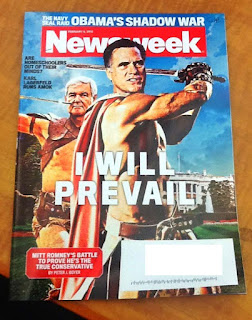I started thinking about this Colosseum course four years ago, when we were in the midst of primary elections and political debates. I woke up one morning in February to a rehashing of the Obama-Clinton debate in
Ashbrook: "What was the sense in the hall? How did Ohioans respond?"
McIntyre: "... When it actually rolls into your town it just has a bigger spectacle, you know. Some of the folks that were following the campaign were rolling their eyes, like "here we go again," "we've heard all this before."..."
Ashbrook: "Did you have a sense, or was there a sense in the hall of who came out on top? It's neck and neck in Texas Ohio Ohio
McIntyre: "What's interesting about the Wolstein Center at Cleveland State University where this debate was held, is that it is a place where there have been boxing matches, big time wrestling spectacles, there was even something called the "King of the Cage" match, where a kick in the teeth really is a kick in the teeth. And so it was a perfect site for this kind of a debate. I think it, I think people did see it as a couple of people who are really battling for it. In the end I don't think any opinions were changed, I don't think any minds were made up, based on last night's debate. But I think people really did, they behaved themselves and didn't cheer on television as they were admonished not to, but I think that people really did think that their candidate represented themselves well, whichever side of the aisle they were on." [You can hear the whole broadcast here.]
The positive identification of Obama and Clinton as gladiators and the suggested parallel between the debate and the other combat sporting events that have been staged at the Wolstein Center
While ancient gladiators had a certain celebrity, they were largely considered disreputable (infames), like prostitutes and others who made a living by "selling" their bodies, and were most frequently slaves. And a Roman citizen most assuredly would not identify with a gladiator. In fact, we can see gladiator being used as a slur against one's political opponents in ancient Rome Cicero Cicero Cicero Cicero Cicero
We are now in the midst of the campaign season, again, and I was quite thrilled to see this on the cover of the February 6th issue of Newsweek.
The issue of politics and the arena is a topic that I will return to in the future. In fact, there's a lot of interesting stuff to think about in Cicero
I had never heard the comparison of a modern political to a gladiator made until the 2008 presidential campaign. Were there earlier comparisons in American politics? Please send them my way if you know of any.

No comments:
Post a Comment